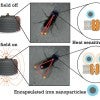
Wireless activation of targeted brain circuits in less than one second
Rice neuroengineers and collaborators have created wireless technology to remotely activate brain circuits.

Wireless activation of targeted brain circuits in less than one second
Rice neuroengineers and collaborators have created wireless technology to remotely activate brain circuits.
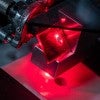
Strain-sensing smart skin ready to deploy
Carbon nanotubes’ natural fluorescence enables a method to detect high strain concentrations, which can lead to damage that threatens the integrity of critical infrastructure like aircraft, buildings, pipelines, bridges and ships.
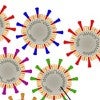
SARS-Arena reveals hidden hooks in virus
SARS-Arena will help to find conserved parts in proteins from SARS-CoV-2 that could be a key for the development of wide-spectrum vaccines.

Emu stands tall at detecting bacteria species
Rice computer scientists develop Emu, which uses long reads of genomes to identify bacteria in a community.
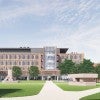
Landmark new engineering and science building on campus to bear Ralph S. O’Connor’s name
A self-made businessman who started out working in oilfields and ended up building an empire in energy and real estate investments will be memorialized at Rice University with a landmark new science and engineering building named in his honor.
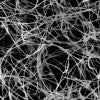
Boron nitride nanotube fibers get real
Rice scientists create the first boron nitride nanotube fibers using the custom wet-spinning process they developed to make carbon nanotube fibers.

City, county and port support Galveston Bay Park study
Houston, Harris County, Port Houston and entrepreneur Joe Swinbank have chipped in for an engineering study of Galveston Bay Park, a chain of man-made islands that Rice University experts have proposed building as both a hurricane barrier and a 10,000-acre public park.

Rice OEDK team creates new feeding device for Houston Zoo’s red river hogs
Just steps away from Rice University, you can meet Neptune, Luna, Vidalia, Artemis and Ophelia, the Houston Zoo’s resident red river hogs.
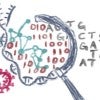
SeqScreen can reveal ‘concerning’ DNA
Rice computer scientists and collaborators develop a program to screen short DNA sequences, whether synthetic or natural, to determine their toxicity.
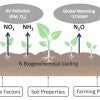
Agriculture emissions pose risks to health and climate
Rice researchers find the economic cost of emissions from agriculture and their risks to populations through air pollution and climate change.
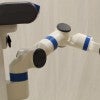
Humans in the loop help robots find their way
Rice computer scientists develop a method that allows humans to help complex robots build efficient solutions to “see” their environments and carry out tasks.

Doctoral alumna wins prestigious Schmidt Science Fellowship
Doctoral graduate Natsumi Komatsu has been awarded a prestigious Schmidt Science Fellowship
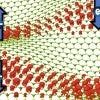
Bumps could smooth quantum investigations
Rice University materials theorists model a contoured surface overlaid with 2D materials and find it possible to control their electronic and magnetic properties. The discovery could simplify research into many-body effects, including quantum systems.
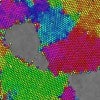
Grain boundaries go with the flow
Rice engineers mimic atom-scale grain boundaries with magnetic particles to see how shear stress influences their movement.
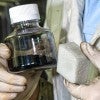
Cars could get a ‘flashy’ upgrade
Rice University chemists, working with the Ford Motor Company, processes waste plastic from end-of-life trucks into graphene for composite materials in new vehicles.